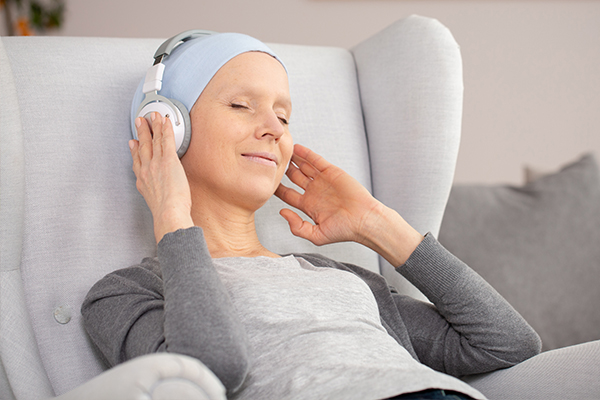In this article:
I got a new lease of life after surviving multiple brain tumors, which has made me more conscientious about my own health as well as the wellbeing of others.

Fighting cancer was a lonely struggle for me and made me realize the importance of patient support. Ever since then, supporting fellow brain tumor patients is my passion.
My goal is to create a sustainable community of brain tumor patients in every stage of diagnosis and recovery that will provide support, hope, and health.
After 10 years of teaching Food and Nutrition at the high school level, I’ve taken this school year off to recover from my brain tumor surgery. My journey has led me to a place where my calling is now to work with brain tumor patients, focusing on those with benign meningioma brain tumors.
Early Symptoms of the Tumor
Due to the location of the tumor and the sponge-like consistency of the brain, the tumor had not caused obvious symptoms, which led to the delayed diagnosis.
But I started experiencing the following symptoms months before the actual diagnosis:
- Decline in vision
- Fatigue
- Lack of focus
- Inability to read for extended periods
- Overall not feeling myself
I did not take these symptoms seriously at first, attributing them to growing age, normal physical changes, and work-related stress.
Diagnosing the Tumor

I contacted my general practitioner in July 2018 for a referral to an ear, nose, and throat specialist.
In the winter of 2017, I contracted a cold that caused swelling in my left lymph nodes and lingering pain in my left ear.
As a result of that illness, I experienced occasional swelling in the same area and ear that was accompanied by a low-grade fever and body aches. These episodes would arise suddenly and dissipate within 24 hours.
In July 2018, I was preparing to move and begin a new job, so I wanted to get this issue resolved before moving. My general practitioner requested an MRI to detect any inflammation in my left inner ear that might be the source of the recurring symptoms.
During the MRI, the technician asked if I had lost my sense of smell or if I had been experiencing headaches. I said I had neither, and he asked why my doctor had requested the MRI, to which I responded by explaining my occasional recurring symptoms.
Forty-five minutes after my MRI, the radiologist called and asked if I could get a pen and paper to take notes and be seated. He slowly explained the MRI had revealed two meningioma brain tumors.
One measured 0.7 cm x 0.4 cm and the larger one measuring 4.5 cm x 4.6 cm x 3.1 cm along the inferior aspect of the anterior cranial fossa involving the olfactory groove, planum sphenoidale, and tuberculum sellae.
My neurologist and neurosurgeon were in agreement that the larger one probably started growing about 10 years prior.
The Cause Behind My Brain Tumor
My neurosurgeon at UCSF said it’s impossible to identify the specific cause of my brain tumors. Research on meningioma brain tumors is ongoing to discover more about the cause and risk factors.
Meningioma brain tumors account for more than 30% of the brain tumors diagnosed every year in the United States. (1) They are more commonly found in women, especially those over 65 years of age, although they can occur at any age. (2)
Given the gender bias of meningioma brain tumors, some are led to believe that hormones may be a consideration in their development. An additional risk factor may be previous exposure to radiation therapy for another condition, although that was not my case.
My Treatment Process
The only treatment option for the large tumor was resection via craniotomy. (3) Because my symptoms were not debilitating and the majority of the meningioma brain tumor was still growing, I was given the option to “watch and wait” with a follow-up MRI in January 2019 to determine the rate of growth.
My neurosurgeon said if the tumor had not grown, I could make the decision on when to have the surgery, but if the tumor had grown or my symptoms worsened, he would make the decision. Thankfully, both the large and small tumor had not grown, so we continued to “watch and wait,” anticipating surgery in the summer of 2018.
The smaller of the two tumors was not taken into consideration. The size rendered it into the long term watch-and-wait status. If it should grow and cause symptoms, it will be a candidate for Gamma Knife treatment.
If the tumor follows the course of a typical slow-growing meningioma, there is a great likelihood that it might never need any treatment at all.
Coping With the Illness

My experience through the process, although surreal, was filled with many stages and much self-discovery. The shock of learning of the brain tumors, especially being discovered incidentally, was overwhelming.
It was difficult to “wrap my brain around” the fact that I had been living with tumors growing in my brain for possibly more than a decade.
As I slowly unearthed the reality and, became educated on the symptoms, I felt a sense of relief. The decline in vision, fatigue, lack of concentration, irritability, and lack of motivation, all the changes I attributed to the aging process, were being explained by my brain tumors.
The inflammation in my lymph node and occasional flare-ups were most likely associated with the swelling in my left frontal lobe due to the tumor pushing into the brain. There were more tests to come once the tumors were discovered. I was scheduled for a field of vision test and an EEG. Both results were not what we had hoped.
My field of vision had been impaired by the tumor, which was encasing my optical nerve on the right side. The EEG revealed seizure waves that had no indication of seizure activity but did put me at high risk for having seizures.
The stress I felt during the process was the concern I had for my daughters and grandchildren. I had a new job I wanted to perform well in, and I did not want to be treated differently due to my recent diagnosis. This was a major diagnosis with a pending craniotomy.
Questions of long-term physical and cognitive changes would run through my mind, and the possibilities formed left images of debilitating circumstances.
It was vital for my well-being and the well-being of my family for my reaction and attitude to remain positive. So I did exactly that. As the time drew closer to the anticipated surgery, I had legal and financial matters to get in order.
The completion of a will and health care directive solidified the reality of my condition and pending brain surgery. It was then that I felt the weight of the world and the stress of the possibilities.
The Most Challenging Part of My Treatment
The biggest challenge throughout the process and treatment was having to limit my driving. Due to the evidence of seizure waves and being at high risk for seizures, I had to limit my driving (4) to work and back, to the store and back, and to my daughters.
Thankfully, the farthest of those excursions was 4.4 miles round trip. Yes, anything can happen, but I felt confident enough to make my own decisions with the recommendations of my neurologist.
It was a total of 18 months from the time of my diagnosis to after my surgery, before I drove out of town.
My Road to Recovery and What Kept Me Going

I would describe my journey as life-changing. To say I reinvented myself seems shallow and nondescript.
The journey was filled with deep spiritual moments, new friendships, an unearthing of my purpose and calling to something bigger than myself, and a desire to do something healthy and good for the world.
The journey left me with a keen awareness of the smallest details in life and appreciation for the complexity of the human body. When people say, “I’m so sorry you had to go through that,” my response is, “If that was the only way I could have learned what I have, I would do it all again.”
What pushed me further was the resolute thought that I had to fight and live for my family and friends, which built my confidence going into surgery.
The assurance I had that I would be fine and everything would be okay as I kissed my daughters’ goodbye in the preop area was the foundation of the perseverance I would need in the days and weeks to come. How I would attain that, I was unsure, but the one thing I was sure of was that I would beat this meningioma brain tumor.
The first time my grandsons visited after my surgery, my oldest grandson, who was 4 years old at that time, was playing on the swings in the backyard. He heard the door open, turned, and saw me standing at the door.
Without a second of hesitation, he ran as fast as he could toward me, and my daughter grabbed my arm for fear his embrace would knock me over, and that was the moment I knew I would never give up. That one hug pushed me further than any physical therapist would.
My Advice to Others Struggling With Brain Tumors
To those who are struggling with a brain tumor, I would say:
1. Stay positive
It’s human and perfectly acceptable to have fear and doubt, but your attitude and thoughts are the one thing you can control. Use prayer, meditation, walks, and time by yourself balanced with interaction with others to decrease stress and increase your mood.
2. Advocate for yourself
No one needs permission to seek a second opinion or change doctors. You deserve the best, and I urge you to seek out the best for your serious diagnosis.
3. Have conversations with those closest to you
Have conversations about the decisions you need to make with those closest to you. Don’t carry the burden by yourself. I am single, but my daughters (all five of them) were part of appointments and decisions. I also consulted with my closest friends.
Emotions can run high with immediate family and keep you from thinking straight. So it’s best to write down the pros and cons, questions, and other concerns to process the whole experience before you talk with your family, friends, and doctors.
4. Join support groups
Support groups are great, and it’s vital to hear others’ experiences with brain tumors, but take your questions to your neurologist, neurosurgeon, or nurse practitioner.
Too much input/information can be overwhelming. Take time to process your own thoughts and feelings. There will be time for support groups down the road.
My Message for Those Who Take Their Health for Granted

My appeal to those who take their health for granted is to come to your senses. Life is precious and can change with a single phone call delivering you the news you never imagined you’d receive. Medical issues are no respecter of gender, age, economic status, or ethnicity.
My plea to you is to think of food as medicine. A consumer nutrition teacher in college said, “Look at the ingredients, and if you can’t pronounce it, don’t eat it.” Those words pierced my heart, and that class forever changed the way I viewed food.
Personally, I was recommended to follow a keto lifestyle for my brain tumors. (5) The recommendation came from a well-known reputable hospital, and although I did my own research, I ultimately found substantial research supporting the keto lifestyle for brain health.
At the time, I was a vegetarian, and so I searched long and hard to find opposing evidence. After reaching out to a brain tumor patient who follows a keto lifestyle and is a certified nutritionist, I was thoroughly convinced of the science.
It was a challenging transformation to introduce meat back into my diet, but for the health of my brain, my brain tumors, and my future, I was determined to implement a keto lifestyle.
Whether you follow a keto lifestyle or not, the most important concept I implore you to grasp is to eat real food. If you think you can’t cook, I’ll tell you what I told my high school students, “If you can read, you can cook.”
With the fast-paced lifestyle with fast food now the norm instead of an occasional treat, the one thing you can do for your health is become aware of what you’re eating and make adjustments, small baby steps in the right direction.
Begin eliminating processed, packaged, premade food, and make a commitment to make real meals from fresh ingredients, at least two or three times a week.
Read the ingredients on everything in your house and everything you pick up at the grocery store. If you can’t pronounce something, consider not eating it. Do your own due diligence as I did. Make your own choice because everything you put in your mouth is either feeding disease or feeding your health.
- Was this article helpful?
- YES, THANKS!NOT REALLY


